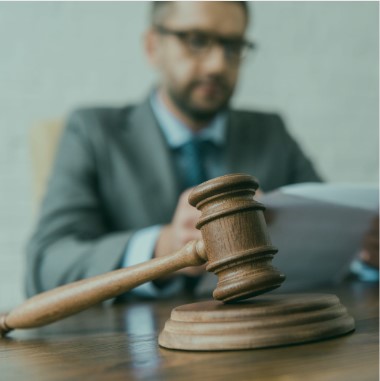5 Essential Qualities to Look for in an Accident Lawyer
Explore the comprehensive guide on accident lawyers: from choosing the right attorney to understanding their role & benefits in personal injury cases.

In the bewildering aftermath of an accident, amidst the chaos of hospital visits, insurance claims, and emotional trauma, finding the right legal aid can feel like searching for a beacon in the fog. The path to justice, though paved with intricacies, shouldn’t be traversed alone. The right accident lawyer is not just an advocate but also a guiding light, ensuring that victims are not lost in the maze of legal jargon and procedures.
Table of Contents
As you stand at this crossroad, yearning for clarity and rightful compensation, our guide endeavors to be your compass. Dive into our ultimate guide on finding the best accident lawyer, and arm yourself with the knowledge to secure the representation you deserve. Your journey to justice and peace of mind starts here. How to Choose a Car Accident Lawyer in Miami

1. Specialization in Accident Law
When you’re dealing with a medical issue, you don’t just see any doctor; you consult a specialist. The same principle applies to law. For accident-related concerns, it’s crucial to work with a lawyer who specializes in accident or personal injury law. They’ll be familiar with the nuances of your case, the potential pitfalls, and the best strategies for success.
2. Experience and Track Record
The world of law is vast, and experience often is the best teacher. Look for an accident lawyer who not only has several years under their belt but also boasts a commendable track record. A history of successful verdicts and settlements is an indicator that the lawyer knows their craft and can navigate the complexities of the courtroom and negotiation table.
3. Transparent Fee Structure
Many accident lawyers operate on a contingency fee basis, which means they only get paid if you win. This setup is beneficial for clients, but it’s still crucial to understand the specifics. A trustworthy lawyer will be transparent about their fee structure, any potential additional costs, and what percentage of the settlement they will take.
4. Strong Communication Skills
Law, especially when it comes to accidents, involves many technical terms and intricate processes. Your lawyer should not only be adept at this but also be capable of breaking down these complexities into understandable terms for you. Regular updates, prompt replies to queries, and open channels of communication are the hallmarks of a good lawyer-client relationship.
5. Compassion and Empathy
Last but by no means least, an ideal accident lawyer should genuinely care about you. Accidents are traumatic, and your lawyer should approach your case with empathy, understanding your situation, and fighting for your rights with passion. A lawyer who sees you as more than just another case, and is committed to helping you get back on your feet, can make all the difference.
Navigating the aftermath of an accident is challenging, but with the right lawyer by your side, it becomes significantly more manageable. By focusing on these five essential qualities, you’ll be in a better position to select a lawyer who can best represent your interests, guiding you towards a favorable resolution.

Who is an Accident Lawyer?
An accident lawyer, commonly referred to as a personal injury attorney, is a legal professional who provides representation to individuals who claim to have been injured, either physically or psychologically, as a result of the negligence or wrongdoing of another person, company, government agency, or any other entity. Here’s a deeper look:
1. Specialization and Expertise:
- Personal Injury Law: This is the primary domain of the accident lawyer. They have specialized knowledge in the laws and statutes related to accidents and personal injuries.
- Torts: Accident lawyers are well-versed in tort law, which includes civil wrongs and economic or non-economic damages to a person’s property, reputation, or rights.
2. Areas of Representation:
- Traffic Accidents: This includes car, motorcycle, truck, and pedestrian accidents.
- Slip and Fall Cases: Incidents where individuals suffer injuries due to hazardous conditions on someone else’s property.
- Workplace Injuries: Accidents or injuries that occur while on the job, which may fall under worker’s compensation or personal injury, depending on circumstances.
- Medical Malpractice: Situations where a medical professional’s negligence leads to patient harm or death.
- Defective Products: Injuries caused by faulty or mislabeled products.
3. Core Duties:
- Legal Advice: Provide guidance to clients on their rights, the legal process, and potential outcomes.
- Representation: Act as an advocate for the client, either in out-of-court settlements or in court if a lawsuit becomes necessary.
- Investigation: Gather evidence, consult with experts, and research laws and previous cases to build a strong case.
- Negotiation: Deal with opposing parties, insurance companies, or defense attorneys to reach a favorable settlement for the client.
4. Compensation Model:
- Most accident lawyers work on a contingency fee basis, which means they only receive a fee if and when they secure a financial recovery for the client. This ensures the lawyer is incentivized to achieve the best possible outcome for the client.
5. Importance of Hiring:
- Accident lawyers level the playing field against insurance companies and corporations with vast resources. They ensure victims get fair compensation for medical bills, lost wages, pain and suffering, and other damages.
In the aftermath of an accident, victims often face a slew of challenges, from physical pain and emotional trauma to financial burdens. An accident lawyer stands as a beacon of hope, guiding clients through the legal maze and fighting for their right to compensation. Their expertise and dedication are essential in helping victims find justice and healing. If someone is involved in an accident or suffers an injury due to another’s negligence, consulting with an accident lawyer is a crucial first step.

Types of Cases Handled by Accident Lawyers
Accident lawyers, often known as personal injury attorneys, represent clients who have sustained injuries or damages due to the negligence or intentional actions of others. These lawyers have expertise in a range of cases, each with its unique legal considerations. Here are some of the most common types of cases they handle:
1. Car Accidents: These are among the most prevalent cases. Lawyers assist victims in obtaining compensation for injuries and damages resulting from collisions involving cars, trucks, motorcycles, and other vehicles.
2. Slip and Fall Accidents: Property owners have a duty to maintain safe conditions. When they neglect this duty, individuals might suffer injuries due to slippery surfaces, uneven flooring, or other hazards.
3. Medical Malpractice: When healthcare professionals fail to provide the standard of care expected in the medical community, resulting in harm to the patient, it falls under medical malpractice.
4. Workplace Accidents: This encompasses a variety of incidents that occur at a person’s place of employment, from construction site accidents to office injuries.
5. Defective Products: Manufacturers and sellers can be held liable if their products cause harm due to defects or lack of adequate warnings.
6. Pedestrian Accidents: These cases involve individuals who are struck and injured by vehicles while walking.
7. Dog Bites and Animal Attacks: Animal owners can be held responsible if their pets harm someone, depending on local laws and circumstances.
8. Wrongful Death: When an individual’s negligence or intentional act results in the death of another person, family members may file a wrongful death lawsuit.
9. Assault and Battery: These are intentional torts where one person causes harm to another through intentional acts, distinct from accidental harm.
10. Premises Liability: Beyond slip and fall cases, this category covers any accident or injury that occurs due to unsafe conditions on someone’s property, like poor lighting, broken stairwells, or inadequate security.
11. Nursing Home Abuse and Neglect: Elderly or vulnerable individuals may suffer from physical, emotional, or financial abuse in nursing homes, and lawyers play a crucial role in seeking justice for them.
12. Birth Injuries: Injuries to a child during the birth process due to medical negligence can have life-long consequences and are grounds for legal action.
13. Toxic Torts: This involves injuries caused by exposure to toxic substances, like asbestos, lead, or harmful chemicals.
14. Public Transportation Accidents: Accidents involving buses, trains, trams, and other forms of public transportation can lead to complicated legal cases due to the number of potential victims and entities involved.
Accident lawyers have a broad spectrum of expertise to handle various incidents where individuals suffer harm due to the actions or negligence of others. If you believe you have a valid claim in any of these areas, consulting with an accident lawyer can provide clarity and direction on how to proceed.

Accidents can be daunting, both physically and emotionally. Having an experienced accident lawyer by your side not only increases the chances of getting fair compensation but also provides peace of mind knowing that a professional is fighting for your rights. If you or a loved one has been a victim of an accident, seeking legal counsel at the earliest is crucial.
Roles and Responsibilities of Accident Lawyers
Accident lawyers, often referred to as personal injury attorneys, are legal professionals who specialize in representing individuals who have suffered harm due to the negligence or intentional actions of others. Their primary goal is to ensure that their clients receive adequate compensation for their injuries and damages. Here are the key roles and responsibilities of accident lawyers:
1. Client Consultation:
- Assessment: Conduct an initial meeting to understand the specifics of the case and determine its viability.
- Legal Advice: Provide insights into the potential outcomes, processes involved, and possible challenges.
2. Investigation and Research:
- Fact-finding: Gather all necessary evidence and information related to the case, such as police reports, medical records, and witness statements.
- Accident Reconstruction: Collaborate with experts, if necessary, to recreate the scene of the accident to determine fault and liability.
3. Case Preparation:
- Drafting Documents: Prepare legal documents required for the case, such as complaints, petitions, and other necessary paperwork.
- Legal Strategy Development: Design a roadmap for the case, outlining key arguments, evidence presentation, and witness testimonies.
4. Representation and Advocacy:
- Negotiation: Engage in discussions with the opposing party or their insurance company in an attempt to reach a fair settlement.
- Litigation: If out-of-court settlements are unsuccessful, represent the client in court, presenting the case and arguing on their behalf.
- Appeals: If the court’s decision is unsatisfactory, they may file an appeal on behalf of the client.
5. Communication:
- Client Updates: Keep clients informed about the progress of their case, potential challenges, and any developments.
- Responsive Feedback: Address any concerns, questions, or feedback from the client promptly.
6. Ethical Responsibilities:
- Confidentiality: Ensure all client information is kept private and not disclosed without permission.
- Conflict of Interest: Avoid representing clients where there’s a potential conflict of interest, ensuring unbiased representation.
7. Financial Management:
- Cost Estimation: Provide clients with a clear understanding of potential costs, including legal fees and other related expenses.
- Contingency Fees: Many accident lawyers operate on a “no win, no fee” basis, meaning they only get paid if the client wins the case.
8. Continuous Learning:
- Legal Updates: Stay updated with the latest laws, regulations, and court rulings relevant to personal injury law.
- Professional Development: Attend seminars, workshops, and other educational platforms to enhance skills and knowledge.
Accident lawyers play a multifaceted role, acting as advocates, advisors, and representatives for their clients. They shoulder the responsibility of ensuring that injured individuals get the justice and compensation they deserve. If you or someone you know has been injured due to someone else’s negligence, it’s crucial to consult with an accident lawyer to understand your rights and the best course of action.
Benefits of Hiring an Accident Lawyer
Hiring an accident lawyer or personal injury attorney after experiencing an accident due to someone else’s negligence can provide a host of benefits. These legal professionals are adept at navigating the complex landscape of personal injury law, and their expertise can prove invaluable in securing justice and fair compensation. Here are the primary advantages of hiring an accident lawyer:
1. Expert Knowledge of the Law:
- Legal Insight: Accident lawyers have in-depth knowledge of personal injury laws, regulations, and statutes in their jurisdiction. Their expertise ensures that clients’ rights are protected and advanced throughout the legal process.
- Familiarity with Legal Procedures: From filing court documents to understanding legal jargon, lawyers handle the intricate details that can be overwhelming for laypersons.
2. Skilled Negotiation:
- Dealing with Insurance Companies: Insurance adjusters aim to minimize payouts. Having a lawyer means having a professional negotiator who can counteract lowball offers and seek fair compensation.
- Settlement Experience: Most personal injury cases are resolved through settlements rather than trials. A seasoned lawyer knows how to negotiate favorable terms for their clients.
3. Objective and Professional Perspective:
- After an accident, emotions can run high. An attorney provides an objective voice and makes decisions based on facts and law, not emotion.
4. Access to Resources:
- Investigative Teams: Many lawyers have a team of investigators to thoroughly examine the technical aspects of your case.
- Expert Witnesses: Lawyers have connections to professionals who can testify on your behalf, such as medical practitioners, accident reconstructionists, and more.
5. Representation in Court:
- If negotiations break down or the opposing party is uncooperative, your lawyer will represent you in court, ensuring your case is presented compellingly and professionally.
6. Contingency Fee Basis:
- Many accident lawyers work on a contingency fee, meaning you only pay if you receive compensation. This structure ensures your lawyer is motivated to secure the best outcome for you.
7. Maximizes Compensation:
- Lawyers understand the full spectrum of damages you can claim, from medical expenses to emotional distress, ensuring you don’t leave money on the table.
8. Saves Time and Stress:
- Handling a claim can be time-consuming, involving obtaining medical records, reviewing police files, and communicating with insurers. A lawyer manages these tasks, letting you focus on recovery.
9. Improved Odds:
- Going against an insurance company or a negligent party alone is akin to showing up to a fight unarmed. Having an accident lawyer drastically increases your chances of getting a favorable result.
10. Peace of Mind:
- Regardless of the outcome, knowing that a professional is advocating for your rights and best interests can provide significant emotional relief during a challenging period.
Accidents can have profound physical, emotional, and financial consequences. In such trying times, having an experienced accident lawyer by your side can make a significant difference. They not only provide legal expertise but also act as a supportive ally, ensuring you get the justice and compensation you rightfully deserve.
Choosing the Right Lawyer: A Comprehensive Guide
Selecting the right lawyer for your legal needs is crucial to achieving the best possible outcome for your case. Whether you’re seeking representation for a personal injury, business dispute, or any other legal matter, the following steps can help guide you through the selection process:
1. Identify Your Legal Needs:
- Begin by clarifying the specific legal assistance you require. Is it related to personal injury, family law, criminal defense, estate planning, or another area?
2. Seek Recommendations:
- Personal Contacts: Ask family, friends, and colleagues for recommendations based on their experiences.
- Professional Referrals: Other professionals, such as accountants or real estate agents, often have connections with lawyers.
3. Research Online:
- Bar Association: Many state and local bar associations offer lawyer referral services, which can help you find a lawyer based on your needs.
- Online Directories: Websites like Avvo, Martindale-Hubbell, and FindLaw provide lawyer listings, reviews, and ratings.
4. Look for Relevant Experience:
- Choose a lawyer with expertise in the specific area of law relevant to your case. For example, if you’ve been in a car accident, seek a personal injury lawyer with experience in such cases.
5. Schedule Consultations:
- Most lawyers offer free initial consultations. Use this opportunity to ask questions, gauge compatibility, and understand how they might handle your case.
6. Consider the Fees:
- Fee Structures: Understand whether they charge a flat fee, hourly rate, or work on contingency (no fee unless you win).
- Transparency: Ensure the lawyer provides clear information about all potential costs and fees.
7. Evaluate Communication and Accessibility:
- You want a lawyer who’ll be responsive and accessible. How quickly do they reply to emails or phone calls? Do they explain legal jargon in understandable terms?
8. Assess Professionalism and Personality:
- Compatibility: It’s important that you feel comfortable with your lawyer, as you’ll need to share personal details and trust their guidance.
- Professionalism: Look for signs of a diligent, organized, and ethical lawyer.
9. Check Credentials and Reputation:
- Bar Status: Ensure they are licensed and in good standing with the state bar association.
- Disciplinary Records: Check if they have any complaints or disciplinary actions against them.
10. Trust Your Gut:
- After gathering all the relevant information, listen to your instincts. Do you feel confident in the lawyer’s abilities and trust them to advocate for your best interests?
Choosing the right lawyer can significantly impact the outcome of your case. It’s essential to invest time in researching, consulting with potential candidates, and evaluating your options. Remember, a good lawyer-client relationship is built on trust, communication, and shared goals. Ensure that the lawyer you select aligns with your needs and values.
What to Expect When Hiring a Lawyer: Navigating the Legal Process
Engaging a lawyer, especially for the first time, can be an intimidating experience. However, understanding what to expect can help alleviate some of the anxiety and equip you to collaborate effectively with your legal representative. Here’s a breakdown of what you can typically anticipate:
1. Initial Consultation:
- Discussion of the Case: The lawyer will listen to your account of the events, ask pertinent questions, and determine the viability of your case.
- Confidentiality: Anything you discuss will remain confidential, so be honest and thorough in your explanation.
2. Fee Agreement:
- Understanding Costs: The lawyer will explain their fees, whether it’s a flat rate, hourly, or on a contingency basis (no fee unless you win). Ensure you comprehend all potential costs.
- Written Agreement: Always get a written fee agreement to avoid any misunderstandings later on.
3. Investigation Phase:
- Your lawyer will gather all relevant documents, evidence, and details about your case. This may include talking to witnesses, obtaining records, and potentially consulting with experts.
4. Legal Strategy:
- Plan of Action: Based on the collected information, the lawyer will outline a strategy for your case, discussing potential outcomes and the steps ahead.
5. Communication:
- Regular Updates: You should expect periodic updates about the progress of your case. Establish a communication protocol from the start, clarifying how and when you’ll be updated.
6. Negotiation & Settlement:
- Many cases, especially personal injury cases, are settled outside of court. Your lawyer will negotiate with the opposing party, aiming to achieve a satisfactory resolution for you.
7. Litigation:
- Filing a Lawsuit: If a settlement can’t be reached, your lawyer might file a lawsuit. They’ll guide you through the complexities of the legal process, including discovery, depositions, and potential trial.
8. Court Proceedings:
- If your case goes to trial, your lawyer will prepare you for testimonies, represent you in court, present evidence, and make arguments on your behalf.
9. Outcome:
- Possible Verdicts: Depending on your case, the resolution might be a favorable verdict, an out-of-court settlement, or, in some instances, a loss. Your lawyer should discuss potential next steps, including the possibility of an appeal.
10. Post-case Follow-up:
- Some cases may require post-resolution actions, like collecting judgments. Your lawyer will guide you through any necessary steps and ensure all paperwork is finalized.
The process of working with a lawyer and navigating the legal landscape can be intricate. However, by understanding what to expect, you can be better prepared and more at ease. Always remember that your lawyer is there to advocate for your best interests, so maintaining open communication and mutual trust is paramount.
Conclusion
Navigating the aftermath of an accident can be daunting, but with the right legal guidance, victims can find the clarity and compensation they deserve. Accident lawyers play a pivotal role in ensuring justice, handling complex legalities, and fighting for the rights of those injured. If you or a loved one has been impacted by someone else’s negligence, securing a seasoned accident lawyer can make all the difference.
With their expertise in personal injury law, you stand a better chance of getting the rightful compensation and peace of mind you seek. For more insights, tips, and guidance on accident lawyers and related topics, continue exploring our blog. Remember, in the world of legal battles, having the right advocate by your side is invaluable.





